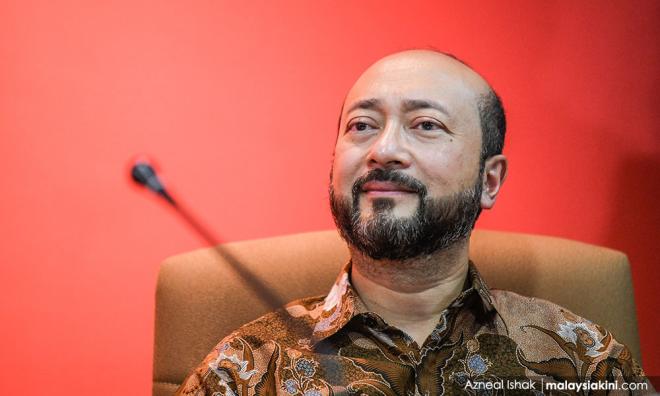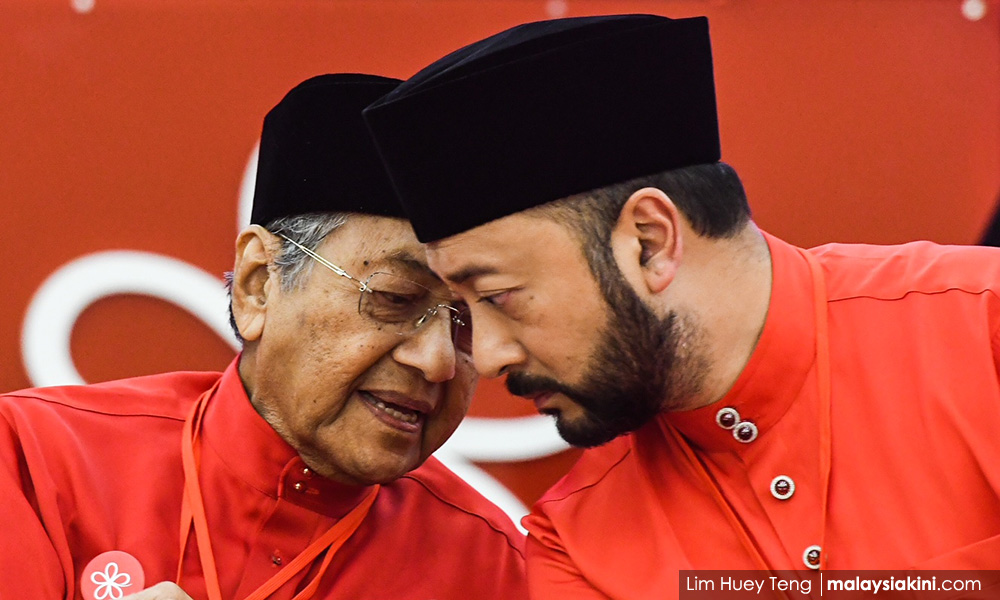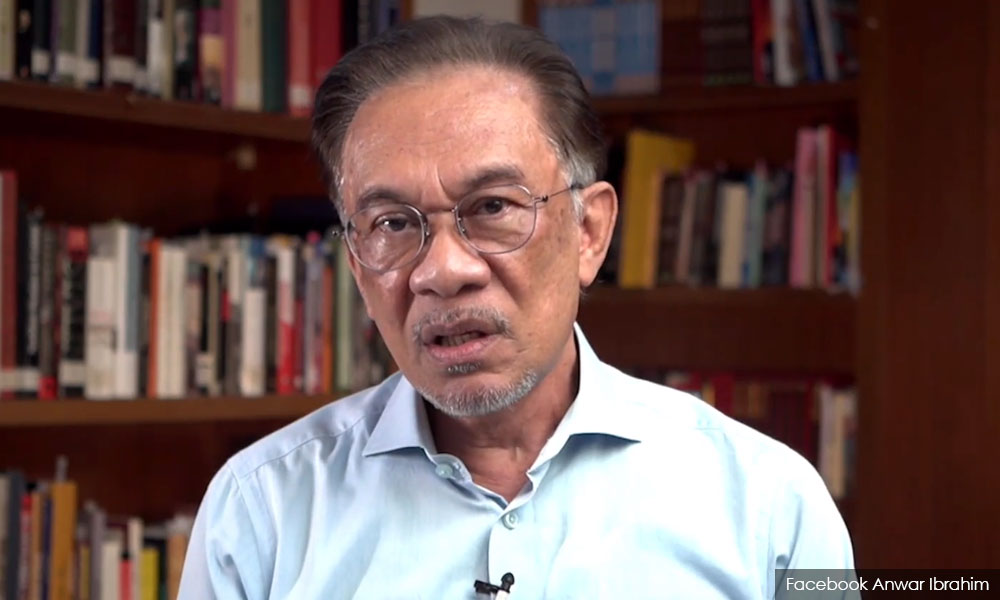
The most interesting thing about Dr Mahathir Mohamad’s latest suggestion is not that Shafie Apdal might be the country’s first East Malaysian prime minister, but the name of his son, Mukhriz Mahathir, has appeared for the first time as a deputy prime minister.
Despite consistent denials in the past, it is clear for the first time that Mahathir had stated his intention for his son to succeed as the prime minister. The latest suggestion had confirmed three things we have always suspected – and under each of these, it is about Mahathir’s intense need for control.
Mukhriz as the rightful heir
Finding a rightful heir has always been Mahathir’s most difficult task since he became the prime minister in 1981. In 22 years, he changed deputy prime ministers four times. Musa Hitam lasted five years, Ghafar Baba lasted seven years, Anwar Ibrahim lasted five years before being thrown to jail on trumped-up charges. Only Abdullah Ahmad Badawi (Pak Lah) was seen as submissive enough to succeed Mahathir.
However, when Pak Lah became the prime minister in 2003, Mahathir realised that it was difficult for him to get what he wanted. Pak Lah defied Mahathir’s orders and dismantled many of his predecessor’s initiatives. Mahathir was unhappy with the that he “finished all government money” because of the mega projects, so he orchestrated the removal of Pak Lah, and replaced him with Najib Abdul Razak, which turns out to be a grave mistake.
The battle between Mahathir and Najib – free of moralistic stances – was the most vicious of all. Finally, Najib was also removed, albeit through a dramatic fashion.
Mahathir thinks he has a “habit of choosing the wrong people” – people who could not give him the control he enjoys.

When in Pakatan Harapan, Mahathir continues his search for a successor he could control. Anwar is definitely not someone who meets the criteria. In fact, Anwar’s rising popularity as the deputy prime minister in 1998, exceeding that of Mahathir, was one of the motivations for Anwar’s sacking. Anwar is not submissive; he has too much a mind of his own.
Muhyiddin Yassin was also not right. Mahathir never believed in Muhyiddin’s competence. He picked Najib over him as the prime minister in 2009 and added himself as the chairman over Muhyiddin’s presidential position in Bersatu – an unusual arrangement in political parties – because of this lack of trust. Likewise, Mahathir never placed much trust on Azmin Ali as his successor; showering him with lucrative cabinet and board positions was only intended to destroy Anwar in PKR.
Now, Shafie Apdal meets that criteria. Shafie is not only a close ally of Mahathir but he will also be the first East Malaysian prime minister. This is monumental for Shafie, and thus he would feel indebted to Mahathir who opened that opportunity for him. This means that it is more likely that Mahathir would get his way.
In fact, Mahathir said that voting for Shafie equals voting for him – implying that the two minds have meshed into one.
But what guarantees that Shafie will not act the way his predecessors did in defying Mahathir’s wishes? There is none. Mahathir is aware of this risk, and that is why he is finally putting his son, Mukhriz, at the position of deputy prime minister for the first time.
As his age grows at each passing day, he realises that his safest bet in protecting his legacy comes from someone who shares the same blood as he. Despite Mukhriz’s low popularity – defeated as youth chief and vice-president in Umno, and being pulled down as the Kedah menteri besar twice – Mahathir understands that his lifelong project of finding a successor must end with his son as the prime minister.
This is not only about nepotism; this is about control. All roads must lead to Mahathir.
Anyone but Anwar
The second thing this has confirmed was that Mahathir will make sure Anwar never becomes the prime minister as long as he is still around. If Mahathir has any intention at all for fulfilling his promise to Harapan for Anwar to be the prime minister, he will support Anwar as the prime minister and his son as the deputy. Or at the very least, put Shafie as the prime minister and Anwar as the deputy.

The reason why Mahathir could not pursue these options – and instead added Mukhriz as a second deputy – was because he needed enough certainty that Anwar does not succeed to be the prime minister. Mahathir’s strategy, therefore, was to circle Anwar with his close confidante, Shafie, and his trusted son, Mukhriz. This puts Anwar in a worse position than before.
Like his postponement of the two-year transition to Anwar, his massive appointments of Anwar’s party foes, and the admittance of Anwar’s unsuitability as the prime minister, this was a confirmation of Mahathir’s insincerity in making Anwar the prime minister.
Mahathir is not here to "help" Anwar become prime minister, as he claims.
All Mahathir wanted to do was to use PKR’s numbers to get enough seats to become the government again. Once he has enough resources and influence, he will get Umno, Bersatu or even PAS MPs on his side to replace PKR’s 38 seats, ousting them, by offering the losing Perikatan Nasional MPs positions, mimicking Muhyiddin’s playbook.
Putting Anwar as the deputy was more formality than any substantive attempt to succeed as prime minister. There is no generosity, no kindness, no intention to fulfil a promise.
Position of weakness
Lastly, Mahathir’s suggestion to install Shafie as the prime minister was not a compromise or a show of magnanimity, but a display of weakness. A few days ago, Mahathir issued an ultimatum to Anwar and PKR that he will end ties with them if they do not support him as the prime minister.

He threatened to find “other ways” to become the prime minister, implying that he may court support from former Umno or Bersatu members instead – despite his denunciation of the “illegitimate” or “kleptocratic” government.
But he did not. Because MPs with Muhyiddin have a long memory of Mahathir’s style of prime ministership and Mahathir could not offer them something more than what they are already enjoying under Muhyiddin.
And because Mahathir could not succeed in doing whatever he wants, he had to innovate a solution that PKR would find acceptable, even though they may be highly unfavourable to them. In other words, Mahathir needs PKR more than they need him.
What Mahathir is betting on is PKR’s appetite for power. But he is finding it increasingly difficult as the current PKR crop was sidelined from Mahathir’s cabinet (not tasting power), and 22 years of struggle has trained PKR to be opposition regulars.
PKR has time on their side because they have nothing more to lose.
The ideal outcome for Mahathir was to marginalise Anwar and prepare a clear pathway for his son to become the prime minister. Ironically, this pathway must now be paved with Anwar’s help. That is why this is proving to be the most difficult challenge he has ever faced. - Mkini
No comments:
Post a Comment
Note: Only a member of this blog may post a comment.